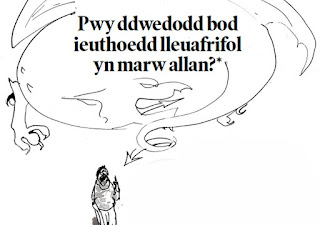Activist Contemplative: sounds odd but for me it is definitely "a thing".
Saturday, 8 February 2020
Why languages are important - including 'minority' ones
Just read this excellent article
from Nation Cymru ostensibly about why it is not funny to joke about the Welsh language, but really about the value of Welsh and by extension other endangered languages all over the world.
I am not a professional linguist, but I have had a chance to indulge in my love of languages since my elementary school days. Over the years, I have become fluent in French and have also studied Spanish, Koine Greek, German, Latin, Yiddish, Italian, Russian, and Hebrew (listed in the approximate order of relative knowledge with Hebrew being the language I feel I know least about).
What I have come to appreciate in my limited experience of languages is the richness of expressiveness each one has in unique ways. Singers know for example the delight of singing in Spanish, Italian, or Latin for the beauty of the syllables of these languages as well as Spanish and Italian being 'languages of love and passion', as it were. Singing the Rachmaninoff All Night Vigil in Old Slavonic (an older form of modern Russian) conveys the depth of religious feeling specific to the Russian Orthodox Church in a way that English cannot do.
As someone who grew up in Quebec fluent in French and English, I was well aware that there were some things you could say lot more easily in French than in English, or in English than French. We would switch back and forth readily from sentence to sentence or even within a sentence use an English or French word to convey something specific that language did better. I am sure anyone fluent in multiple languages has experienced this.
There is also the point made within the article linked above that every language one acquires opens up conversation with speakers of that language in a way that cannot be defined, only experienced and felt.
Languages are treasures. The more one knows, and the more one knows of each language in vocabulary and breadth, the richer one is in being able to communicate as well as touch the regionalized and deeply human experiences that went into shaping that language.
Subscribe to:
Post Comments (Atom)

No comments:
Post a Comment